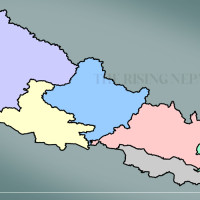- Sunday, 25 May 2025
Youth in Waling working to preserve Sati Ghatu dance
By Radha Krishna Dumre,Waling, May 8: Youth of Waling in Syangja district are taking the initiative to preserve Sati Ghatu dance, a cultural dance of the Gurung community that has been gradually fading away.
The dance is particularly performed for three days by girls who are not menstruated.
The youth of Ramche in Ward No. 3 of Waling Municipality in Syangja have come together to preserve this dance.
They recently organised a three-day celebration of the dance, which began on the full moon day of the Nepali month of Baisakh and concluded on Sunday.
The youth are working to ensure that the Sati Ghatu dance remains an important part of the cultural heritage of the Gurungs.
Sati Ghatu is just one of the many types of Ghatus that are based on mythological stories.
Deuraj Gurung, president of the local Shivamitra Tamu Yuwa Pariwar, said that the beginning and end of the dance are particularly fascinating.
While the Sati Ghatu is a traditional dance of the Gurung community, unfortunately, it is not in practice in many places in recent times.
Even in Waling, the dance was postponed for a few years because of the COVID-19 pandemic, and it has been resumed this year, said Gurung.
During the performance of Sati Ghatu, it is customary to avoid undertaking any significant work in the village. Before the dance commences, the local community performs worship ceremonies dedicated to their deities in all directions of the village.
The Sati Ghatu dance is performed by girls who have fasted for three days, consuming only one meal per day and that too only after 12 noon. This annual dance is held on the occasion of Buddha Purnima. In the Sati Ghatu dance, a story of emotion is narrated avoiding violence and polishing.
Gurung emphasised the importance of the younger generation taking responsibility for preserving their cultural heritage and reviving the traditions of their ancestors. The dance concludes by making an offering of animals and performing a puja on a nearby hill.
Despite the Gurung community's efforts to preserve their culture, they have expressed disappointment over the lack of government initiatives to protect their traditions.
They believe that if more attention is paid to preserving and safeguarding this cultural practice, future generations will be able to experience and enjoy the Sati Ghatu dance, said Gurung.









-original-thumb.jpg)






-original-thumb.jpg)
